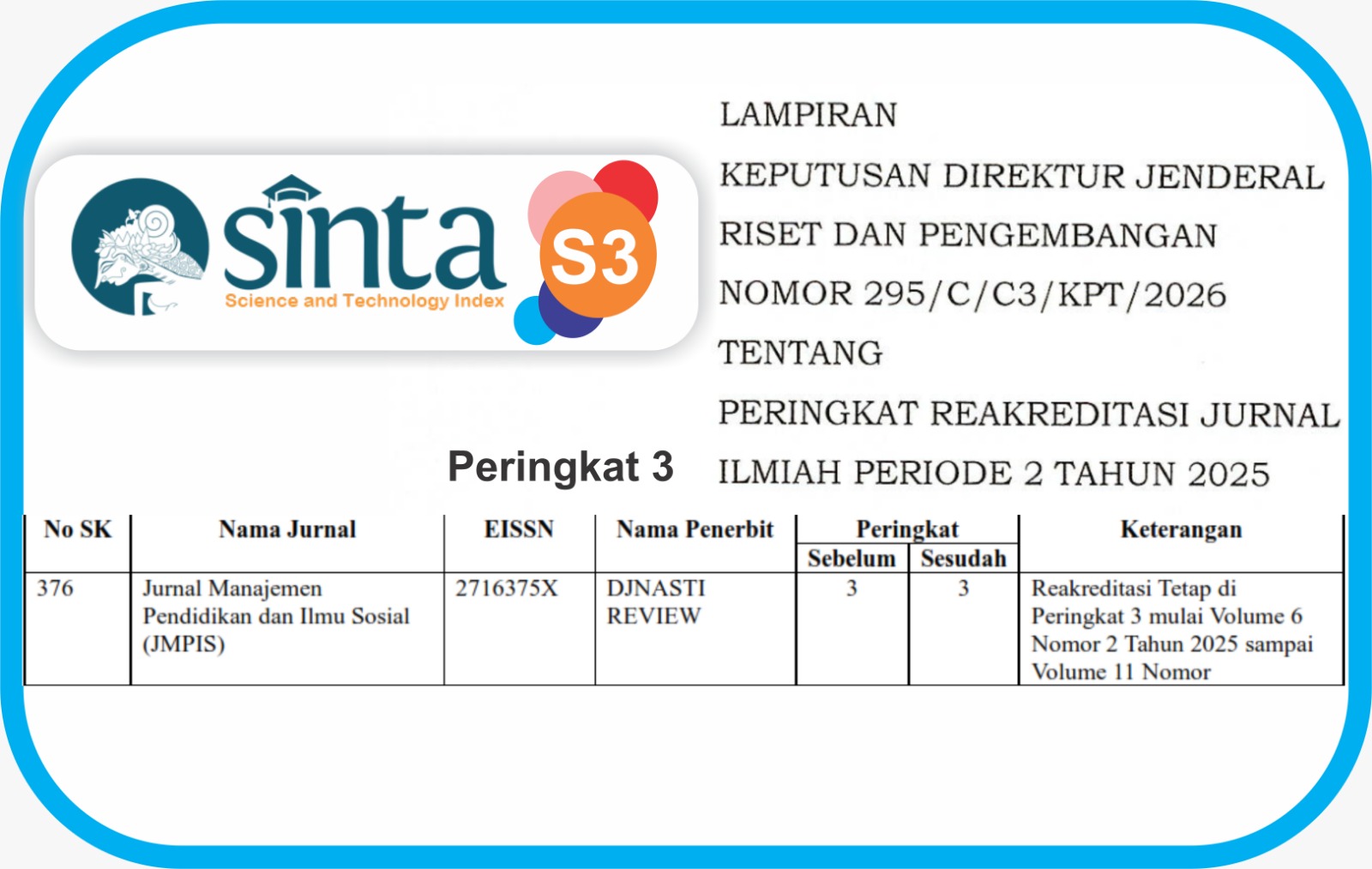Hubungan Antara Loneliness dan Subjective Well-being yang Dimediasi oleh Online Social Support dan Self-efficacy pada Individu Dewasa Awal yang Menggunakan Media Sosial di Indonesia
DOI:
https://doi.org/10.38035/jmpis.v6i1.3089Keywords:
Kesepian, Kesejahteraan Subjektif, Dukungan Sosial Online, Efikasi Diri, Media SosialAbstract
Penelitian ini bertujuan untuk mengeksplorasi hubungan antara kesepian dan kesejahteraan subjektif pada pengguna media sosial dewasa awal di Indonesia, serta peran mediasi dukungan sosial online dan efikasi diri dalam hubungan tersebut. Metode penelitian yang digunakan adalah survei kuantitatif yang melibatkan 411 responden dewasa awal yang aktif menggunakan media sosial. Penelitian ini menggunakan instrumen UCLA Loneliness Scale, Skala Kesejahteraan Subjektif Indonesia, Skala Dukungan Sosial, dan Skala Efikasi Diri. Hasil analisis data menunjukkan bahwa variabel kesepian memiliki hubungan terhadap subjective well-being (0.641>0.089), namun variabel kesepian tidak berpengaruh terhadap subjective well-being (0.961<0.001), oleh karena itu diperlukan peran efikasi diri dan dukungan sosial online sebagai mediator. Efikasi diri dan dukungan sosial memiliki tingkat pengaruh yang signifikan sebagai mediator kesepian dan kesejahteraan subjektif. Dukungan sosial online memiliki angka yang signifikan melalui uji Hayes Process Macro sebesar 0.242, dan efikasi diri sebesar 0.367, kedua variabel ini memiliki nilai yang berbeda namun tetap signifikan sebagai mediator antara variabel kesepian dan kesejahteraan subjektif. Hal ini dapat diartikan bahwa variabel efikasi diri lebih efektif sebagai mediator bagi individu yang kesepian untuk mencapai kesejahteraan subjektif. Tingkat efikasi diri yang tinggi dapat mengurangi dampak negatif kesepian terhadap kesejahteraan subjektif, namun temuan ini mengindikasikan bahwa dukungan sosial dapat menjadi mediator bagi individu yang kesepian untuk mencapai kesejahteraan subjektif melalui platform media sosial.
References
Arnett, J. J. (2000). Emerging adulthood: A theory of development from the late teens through the twenties. American Psychologist, 55(5), 469.
Brajša-Žganec, A., Kaliterna-Lipov?an, L., & Hanzec, I. (2018). The relationship between social support and subjective well-being across the lifespan. Društvena Istraživanja, 27(1), 45–47.
Brandtzæg, P. B., & Heim, J. (2009). Why people use social networking sites. Online Communities and Social Computing: Third International Conference, OCSC 2009, Held as Part of HCI International 2009, San Diego, CA, USA, July 19-24, 2009. Proceedings 3, 143–152.
Chiao, C., Chen, Y.-H., & Yi, C.-C. (2019). Loneliness in young adulthood: Its intersecting forms and its association with psychological well-being and family characteristics in Northern Taiwan. PLoS One, 14(5), e0217777.
Clayton, R. B., Osborne, R. E., Miller, B. K., & Oberle, C. D. (2013). Loneliness, anxiousness, and substance use as predictors of Facebook use. Computers in Human Behavior, 29(3), 687–693.
Curtin, S. C., & Heron, M. P. (2019). Death rates due to suicide and homicide among persons aged 10–24: United States, 2000–2017.
Czaja, S. J., Moxley, J. H., & Rogers, W. A. (2021). Social support, isolation, loneliness, and health among older adults in the PRISM randomized controlled trial. Frontiers in Psychology, 12, 728658.
Diener, E. (1984). Subjective well-being. Psychological Bulletin, 95(3), 542.
Direktorat Statistik Keuangan, Teknologi Informasi, dan P. (2023). Badan Pusat Statistik. https://www.bps.go.id/publication/2023/08/31/131385d0253c6aae7c7a59fa/statistik- telekomunikasi-indonesia-2022.html
Geirdal, A. Ø., Ruffolo, M., Leung, J., Thygesen, H., Price, D., Bonsaksen, T., & Schoultz, M. (2021). Mental health, quality of life, wellbeing, loneliness and use of social media in a time of social distancing during the COVID-19 outbreak. A cross-country comparative study. Journal of Mental Health, 30(2), 148–155.
Hakim, W., Mar’at, S., & Suyasa, P. T. Y. S. (2023). WHY DO EMERGING ADULTS FEEL LONELY? THE ROLE OF PERCEIVED SOCIAL SUPPORT AND PSYCHOLOGICAL CAPITAL. International Journal of Application on Social Science and Humanities, 1(3), 85–92.
Hawkley, L. C., Burleson, M. H., Berntson, G. G., & Cacioppo, J. T. (2003). Loneliness in everyday life: cardiovascular activity, psychosocial context, and health behaviors. Journal of Personality and Social Psychology, 85(1), 105.
Huppert, F. A. (2009). Psychological well?being: Evidence regarding its causes and consequences. Applied Psychology: Health and Well?being, 1(2), 137–164.
Jia, W., Liu, L., & Peng, G. (2024). The Impact of Social Media on Users’ Self-Efficacy and Loneliness: An Analysis of the Mediating Mechanism of Social Support. Psychology Research and Behavior Management, 593–612.
Kang, H.-W., Park, M., & Wallace, J. P. (2018). The impact of perceived social support, loneliness, and physical activity on quality of life in South Korean older adults. Journal of Sport and Health Science, 7(2), 237–244.
Kim, B., & Kim, Y. (2017). College students’ social media use and communication network heterogeneity: Implications for social capital and subjective well-being. Computers in Human Behavior, 73, 620–628.
Kusnandar, V. B. (2022). Indonesia Masuk Daftar 10 Negara Pengguna Internet Terbesar di Asia. Databoks. https://databoks.katadata.co.id/datapublish/2022/12/22/indonesia-masuk-daftar-10-negara- pengguna-internet-terbesar-di-asia
Lanz, M., & Tagliabue, S. (2007). Do I really need someone in order to become an adult? Romantic relationships during emerging adulthood in Italy. Journal of Adolescent Research, 22(5), 531–549.
Li, J., & Zhou, X. (2021). Internet use and Chinese older adults’ subjective well-being (SWB): The role of parent-child contact and relationship. Computers in Human Behavior, 119, 106725.
Liang, X., & Wei, L. (2008). A preliminary study of college students’ online social support testing. Chinese Journal of Psychological Science, 31(3), 689–691.
Liu, R., Zeng, P., & Quan, P. (2018). The role of hope and self-efficacy on nurses’ subjective well-being. Asian Social Science, 14(4), 18.
Lönnqvist, J.-E., & große Deters, F. (2016). Facebook friends, subjective well-being, social support, and personality. Computers in Human Behavior, 55, 113–120.
Matthews, T., Danese, A., Caspi, A., Fisher, H. L., Goldman-Mellor, S., Kepa, A., Moffitt, T. E., Odgers, C. L., & Arseneault, L. (2019). Lonely young adults in modern Britain: findings from an epidemiological cohort study. Psychological Medicine, 49(2), 268–277.
Nemecek, D. (n.d.). Loneliness And Work.
Özdogan, A. Ç. (2021). Subjective Well-Being and Social-Emotional Loneliness of University Students: The Mediating Effect of the Meaning of Life. Journal of Pedagogical Research, 5(1), 18–30.
Perlman, D., & Peplau, L. A. (1981). Toward a social psychology of loneliness. Personal Relationships, 3, 31–56.
Petrosyan, A. (2023). Internet and Social Media Users in the World 2023. Statista.
Prabowo, C. X., & Dewi, F. I. R. (2021). The correlation between fear of missing out and subjective well-being among young adulthood. International Conference on Economics, Business, Social, and Humanities (ICEBSH 2021), 1431–1436.
Riyanto, G. P., & Pratomo, Y. (2023). Orang Indonesia Internetan Lebih dari 7 Jam Sehari, Paling Sering Buka WA dan IG. https://tekno.kompas.com/read/2023/02/14/14020097/orang-indonesia-internetan-lebih-dari- 7-jam-sehari-paling-sering-buka-wa-dan- ig#:~:text=Adapun layanan yang paling banyak
Russell, D. W., & Pang, Y. C. (2016). Loneliness. Springer EBooks. https://doi.org/10.1007/978-3-319-28099-8_1085-1
Saltzman, L. Y., Hansel, T. C., & Bordnick, P. S. (2020). Loneliness, isolation, and social support factors in post-COVID-19 mental health. Psychological Trauma: Theory, Research, Practice, and Policy, 12(S1), S55.
Sander, V. (2020). Report: Loneliness and Anxiety During Lockdown. SocialPro. https://socialself.com/loneliness-corona/
Santika, E. F. (2023). Pengguna Medsos Berpendidikan Tinggi Lebih Banyak Ditemukan di Twitter. Databoks. https://databoks.katadata.co.id/index.php/datapublish/2023/11/01/pengguna-medsos- berpendidikan-tinggi-lebih-banyak-ditemukan-di-twitter
Schwartz, S. J., Côté, J. E., & Arnett, J. J. (2005). Identity and agency in emerging adulthood: Two developmental routes in the individualization process. Youth & Society, 37(2), 201–229.
Siedlecki, K. L., Salthouse, T. A., Oishi, S., & Jeswani, S. (2014). The relationship between social support and subjective well-being across age. Social Indicators Research, 117, 561–576.
Smith, K. M., Cobb, K. F., Reed-Fitzke, K., Ferraro, A. J., Duncan, J. M., & Lucier-Greer, M. (2022). Connections between parental reciprocity and emerging adult depressive symptoms and loneliness: The role of peer social support. Canadian Journal of Behavioural Science/Revue Canadienne Des Sciences Du Comportement, 54(1), 52.
Su, P., & He, M. (2024). The mediating role of loneliness in the relationship between smartphone addiction and subjective well-being. Scientific Reports, 14(1), 4460.
Suanet, B., & van Tilburg, T. G. (2019). Loneliness declines across birth cohorts: The impact of mastery and self-efficacy. Psychology and Aging, 34(8), 1134.
Sugiharto, R. (2016). Pengguna internet di Indonesia didominasi anak muda. https://www.cnnindonesia.com/teknologi/20161024161722-185-167570/pengguna-internet- di-indonesia-didominasi-anak-muda, Halaman Web
Surkalim, D. L., Luo, M., Eres, R., Gebel, K., Van Buskirk, J., Bauman, A., & Ding, D. (2022). The prevalence of loneliness across 113 countries: systematic review and meta-analysis. Bmj, 376.
Tiwari, N., Tiwari, V. K., Waldmeier, L., Balwierz, P. J., Arnold, P., Pachkov, M., Meyer-Schaller, N., Schübeler, D., van Nimwegen, E., & Christofori, G. (2013). Sox4 is a master regulator of epithelial-mesenchymal transition by controlling Ezh2 expression and epigenetic reprogramming. Cancer Cell, 23(6), 768–783.
Varrella, S. (2021). Loneliness among adults worldwide by country 2021. Statista. https://www.statista.com/statistics/1222815/loneliness-among-adults-by-country/
Vasan, S., Eikelis, N., Lim, M. H., & Lambert, E. (2023). Evaluating the impact of loneliness and social isolation on health literacy and health-related factors in young adults. Frontiers in Psychology, 14, 996611.
Wang, C.-M., Qu, H.-Y., & Xu, H.-M. (2015). Relationship between social support and self-efficacy in women psychiatrists. Chinese Nursing Research, 2(4), 103–106.
Xi, X., Wang, Y., & Jia, B. (2017). The effect of social support on subjective well-being: Mediator roles of self-esteem and self-efficacy. 2017 3rd International Conference on Humanities and Social Science Research (ICHSSR 2017), 487–499.
Yap, S. T., & Baharudin, R. (2016). The relationship between adolescents’ perceived parental involvement, self-efficacy beliefs, and subjective well-being: A multiple mediator model. Social Indicators Research, 126, 257–278.
Yung, S. T., Chen, Y., & Zawadzki, M. J. (2023). Loneliness and psychological distress in everyday life among Latinx college students. Journal of American College Health, 71(5), 1407–1416.
Zauderer, S. (2023). 49 Loneliness Statistics: How Many People are Lonely?
Zhang, X., & Dong, S. (2022). The relationships between social support and loneliness: a meta-analysis and review. Acta Psychologica, 227, 103616.
Downloads
Published
How to Cite
Issue
Section
License
Copyright (c) 2024 Joan Victory, Riana Sahrani

This work is licensed under a Creative Commons Attribution 4.0 International License.
Hak cipta :
Penulis yang mempublikasikan manuskripnya di jurnal ini menyetujui ketentuan berikut:
- Hak cipta pada setiap artikel adalah milik penulis.
- Penulis mengakui bahwa Jurnal Manajemen Pendidikan dan Ilmu Sosial (JMPIS) berhak menjadi yang pertama menerbitkan dengan lisensi Creative Commons Attribution 4.0 International (Attribution 4.0 International CC BY 4.0) .
- Penulis dapat mengirimkan artikel secara terpisah, mengatur distribusi non-eksklusif manuskrip yang telah diterbitkan dalam jurnal ini ke versi lain (misalnya, dikirim ke repositori institusi penulis, publikasi ke dalam buku, dll.), dengan mengakui bahwa manuskrip telah diterbitkan pertama kali di Jurnal Manajemen Pendidikan dan Ilmu Sosial (JMPIS).











































































